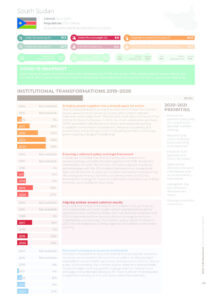Nutrition situation
Under five stunting (%)
31.3
Under five overweight (%)
6
Anaemia in women 15-49 years (%)
34
Under five wasting (%)
22.7
Low birth weight (%)
n.a.
0 to 5-month-old exclusive breastfeeding (%)
44.5
Adolescent overweight (%)
Male:
/ Female:
Adult overweight (%)
Male:
/ Female:
Adult obesity (%)
Male:
/ Female:
Adult diabetes (%)
Male:
/ Female:
COVID-19 snapshot
South Sudan’s health and food systems were tested by COVID-19. As a result of the double crisis of the pandemic and the floods (IPC3), about 5.29 million South Sudanese are estimated to be facing malnutrition or acute food insecurity.
Institutional transformations 2019-2020
Bringing people together into a shared space for action
There has been continued alignment of all nutrition stakeholders’ plans and actions with the Somalia National Development Plan (NDP) and nutrition strategy targets at national and subnational level. This has improved coordination and harmonisation of the multistakeholder platform. Currently, nutrition actors continue to align their programmes with targets in the nutrition chapter of the NDP. The Common Results Framework (CRF) translates NDP and other legal and policy frameworks into clear outputs.Ensuring a coherent policy and legal framework
A roadmap to finalise the nutrition policy and costed multisectoral strategy and plan has been agreed with SUN Movement stakeholders. In 2020, the Ministry of Finance aligned its policies and strategies with the 2014 Malabo Declaration on Accelerated Agricultural Growth, to scale up nutrition intervention and planning. The Intergovernmental Authority on Development (IGAD) has developed a strategy for resource mobilisation and advocacy to help member countries better face crises.Aligning actions around common results
As a Common Results Framework for nutrition is not yet in place, SUN stakeholders in South Sudan remain aligned behind jointly agreed national nutrition priorities, the humanitarian response and IGAD’s food and nutrition security alliance strategy for resource mobilisation and advocacy. The nutrition policy will be finalised in 2021 and will endeavour to bring together all nutrition actors in the country.Financial tracking and resource mobilisation
Members of parliament have committed to ensuring that domestic resources are earmarked for nutrition, as well as tracking budget expenditure across health, agriculture and education sectors. Also, as a part of its mandate, the nutrition cluster relies on a humanitarian focused budget tracking system to gauge nutrition investments and gaps and undertake advocacy for more nutrition financing and programme delivery, in line with jointly identified priorities.2020-2021 Priorities
- Finalise the nutrition policy and the costed multisectoral nutrition strategy.
- Research and assess evidencebased planning and responses.
- Establish SUN Business and Donor Networks.
- Advocate for domestic resource mobilisation and an accountability framework.
- Strengthen the humanitariandevelopment nexus.
- Develop a nutrition curriculum.
Download

